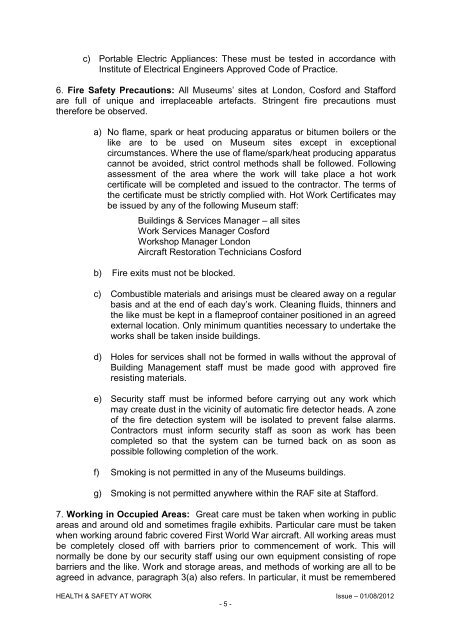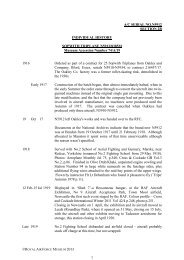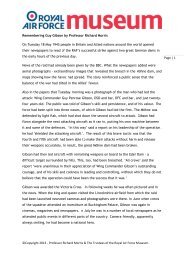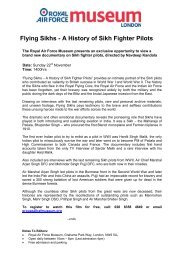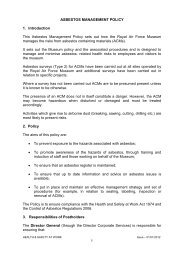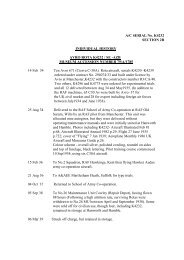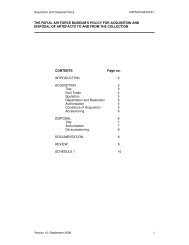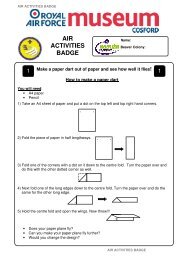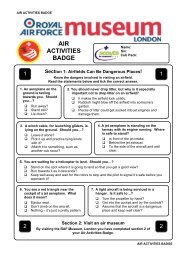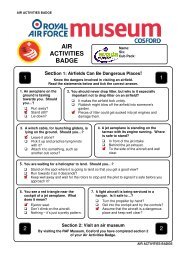Site Instructions and Safety Regulations for Contractors Aug 2012
Site Instructions and Safety Regulations for Contractors Aug 2012
Site Instructions and Safety Regulations for Contractors Aug 2012
You also want an ePaper? Increase the reach of your titles
YUMPU automatically turns print PDFs into web optimized ePapers that Google loves.
c) Portable Electric Appliances: These must be tested in accordance with<br />
Institute of Electrical Engineers Approved Code of Practice.<br />
6. Fire <strong>Safety</strong> Precautions: All Museums’ sites at London, Cos<strong>for</strong>d <strong>and</strong> Staf<strong>for</strong>d<br />
are full of unique <strong>and</strong> irreplaceable artefacts. Stringent fire precautions must<br />
there<strong>for</strong>e be observed.<br />
a) No flame, spark or heat producing apparatus or bitumen boilers or the<br />
like are to be used on Museum sites except in exceptional<br />
circumstances. Where the use of flame/spark/heat producing apparatus<br />
cannot be avoided, strict control methods shall be followed. Following<br />
assessment of the area where the work will take place a hot work<br />
certificate will be completed <strong>and</strong> issued to the contractor. The terms of<br />
the certificate must be strictly complied with. Hot Work Certificates may<br />
be issued by any of the following Museum staff:<br />
Buildings & Services Manager – all sites<br />
Work Services Manager Cos<strong>for</strong>d<br />
Workshop Manager London<br />
Aircraft Restoration Technicians Cos<strong>for</strong>d<br />
b) Fire exits must not be blocked.<br />
c) Combustible materials <strong>and</strong> arisings must be cleared away on a regular<br />
basis <strong>and</strong> at the end of each day’s work. Cleaning fluids, thinners <strong>and</strong><br />
the like must be kept in a flameproof container positioned in an agreed<br />
external location. Only minimum quantities necessary to undertake the<br />
works shall be taken inside buildings.<br />
d) Holes <strong>for</strong> services shall not be <strong>for</strong>med in walls without the approval of<br />
Building Management staff must be made good with approved fire<br />
resisting materials.<br />
e) Security staff must be in<strong>for</strong>med be<strong>for</strong>e carrying out any work which<br />
may create dust in the vicinity of automatic fire detector heads. A zone<br />
of the fire detection system will be isolated to prevent false alarms.<br />
<strong>Contractors</strong> must in<strong>for</strong>m security staff as soon as work has been<br />
completed so that the system can be turned back on as soon as<br />
possible following completion of the work.<br />
f) Smoking is not permitted in any of the Museums buildings.<br />
g) Smoking is not permitted anywhere within the RAF site at Staf<strong>for</strong>d.<br />
7. Working in Occupied Areas: Great care must be taken when working in public<br />
areas <strong>and</strong> around old <strong>and</strong> sometimes fragile exhibits. Particular care must be taken<br />
when working around fabric covered First World War aircraft. All working areas must<br />
be completely closed off with barriers prior to commencement of work. This will<br />
normally be done by our security staff using our own equipment consisting of rope<br />
barriers <strong>and</strong> the like. Work <strong>and</strong> storage areas, <strong>and</strong> methods of working are all to be<br />
agreed in advance, paragraph 3(a) also refers. In particular, it must be remembered<br />
HEALTH & SAFETY AT WORK Issue – 01/08/<strong>2012</strong><br />
- 5 -


